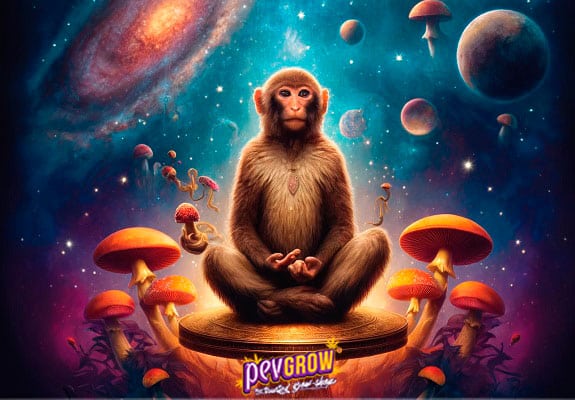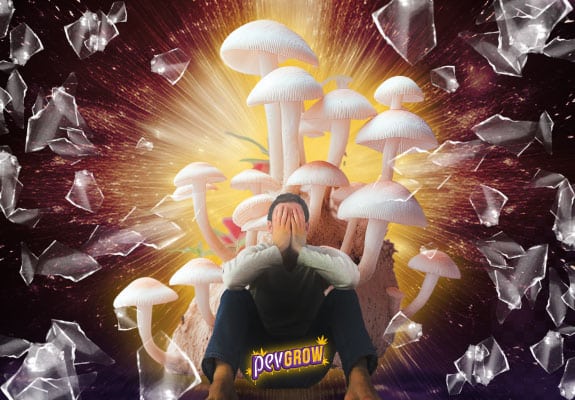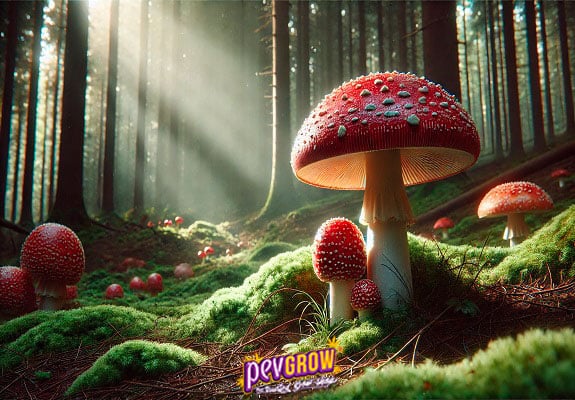- Discover Terence McKenna, a pioneer in ethnobotany and psychedelic culture, renowned for his studies on magic mushrooms and their global influence.
- Magic Mushrooms: A Guide for Beginners
- Dose of Magic Hallucinogenic Mushrooms


In constant struggle for the regulation of cannabis, mainly in the medicinal field.
30-04-2024 07:00:00 - Updated: 30 April, 2024
Terence McKenna, an iconic figure in the world of ethnobotany and psychedelic studies, left an indelible mark on contemporary culture through his deep interest and exploration of magic mushrooms. This article delves into McKenna’s life, work, and legacy, unraveling his relationship with magic mushrooms, his revolutionary theories, and his lasting impact on both science and popular culture.
🎯 Who was Terence McKenna?
Terence Kemp McKenna was born on November 16, 1946, and from an early age showed a keen interest in nature and science. He studied ethnobotany at the University of California, Berkeley, where he began to forge his path as one of the most prominent advocates for altered states of consciousness. McKenna, along with his brother Dennis, traveled extensively in search of psychoactive plants, a journey that led them to deepen their study and use of magic mushrooms.
📲 Terence McKenna and Magic Mushrooms
Terence McKenna was a pioneer in the study and dissemination of magic mushrooms, especially psilocybin mushrooms, but also mescaline and DMT among others. His fascination with these organisms began from his early experiences with psychedelic substances, which he considered tools for exploring the limits of human consciousness. Throughout his life, McKenna studied and experimented with a wide variety of psychedelics, but it was mushrooms that captured his interest in a more profound and lasting manner.
McKenna described psilocybin mushrooms as catalysts for the evolution of human consciousness. According to him, these were not only important for their psychoactive effects but also for their potential to expand human perception, facilitating a deeper understanding of the world and ourselves. His interest was intensified after his expeditions in the Amazon, where along with his brother Dennis, he discovered and experimented with varieties of mushrooms, especially Psilocybe cubensis. This fortuitous encounter with vast fields of mushrooms in the Amazon would be fundamental for his future research and theories. To give you an idea of the importance of this man in psychonautics, the McKenaii mushroom cultivation kit honors his name.

🚀 The Philosophy of Terence McKenna’s “Heroic Doses”
One of McKenna’s most notable concepts is that of “heroic doses”. This term refers to the ingestion of five grams or more of dried mushrooms, a considerably larger amount than is typically administered for light psychedelic effects. According to McKenna, these doses allow users to transcend their ordinary perceptual limitations and access deeper states of introspection and psychological exploration.
McKenna argued that at these doses, psilocybin mushrooms could reveal the underlying patterns of existence, connect individuals to a “higher intelligence,” or allow them to experience what he described as “the inner alchemy” of one’s own psyche. This process, he maintained, was crucial for self-transformation and spiritual development, and served as a formidable tool for personal growth and metaphysical understanding.
McKenna’s proposal of heroic doses not only challenged conventional psychedelic use practices but also raised questions about safety and responsibility in their use. Despite criticism and skepticism from the scientific community, his ideas have significantly influenced modern psychedelia and continue to be a reference point for those interested in the depths of the psychedelic experience.
In summary, Terence McKenna saw in psilocybin mushrooms a gateway to unknown dimensions of the human mind, promoting a radical approach that invites us to reconsider what we know about consciousness and its limits. His legacy in the field of psychedelics continues to inspire new generations to carefully explore these substances as tools for discovery and personal transformation.
✅ The Art and Literature of Terence McKenna
The visual art related to Terence McKenna is deeply symbolic and intrinsically linked to his experiences and psychedelic theories. Although McKenna was not a visual artist himself, the illustrations that accompany his lectures and books are imbued with the psychedelic aesthetic he so thoroughly explored. These works often depict transcendental visions, complex geometric patterns, and hallucinatory landscapes that attempt to capture the essence of experiences with psychedelics. The art surrounding his legacy invites observers to deep introspection, reflecting the interconnectedness of nature, the cosmos, and human consciousness.
🔥 Review of His Main Books and His Influence on Psychedelic Culture
Terence McKenna was a prolific writer whose books have left an indelible mark on psychedelic culture. Among his most influential works are:
- “The Invisible Landscape: Mind, Hallucinogens, and the I Ching” co-written with his brother Dennis McKenna, explores their experiences in the Amazon and posits theories about time, space, and consciousness.
- “Food of the Gods: The Search for the Original Tree of Knowledge” is perhaps his best-known book, arguing that the use of psychedelics was central to the evolution of human consciousness and should be revered as a catalyst for society and culture.
- “True Hallucinations: Being an Account of the Author’s Extraordinary Adventures in the Devil’s Paradise” details his exploration of the Amazon and his experiments with psilocybin, offering a vivid narrative of his psychedelic experiences and philosophical reflections.
These texts not only provide detailed accounts of his experiences with psychedelics but also propose bold theories about the nature of reality and the role of humans in the cosmos. The way McKenna intertwines science, philosophy, and mysticism has captured the imagination of many and continues to inspire the psychedelic community and beyond.
McKenna’s influence on psychedelic culture is immense; his books have not only educated generations on the importance of psychedelics as tools for mental exploration but have also promoted a deeper understanding of what the psychedelic experience means in the context of the human quest for knowledge and spiritual connection.
🧐 The End of His Journey: Death and Legacy
Terence McKenna passed away on April 3, 2000, at his home in San Rafael, California, at the age of 53. The cause of his death was glioblastoma multiforme, a very aggressive type of brain tumor. McKenna was diagnosed with this disease in May 1999 after suffering from severe headaches for several months and undergoing an MRI that revealed the presence of the tumor. Following the diagnosis, he decided to explore various alternative treatments along with conventional medicine, but unfortunately, he passed away less than a year after his diagnosis.
👾 Importance of His Last Words and His Ongoing Legacy
Although no formal “last words” of McKenna were recorded, his thoughts and philosophy of life were widely shared in his final days through his speeches and writings. McKenna spoke about the importance of the psychedelic experience not only as a means to explore the mysteries of the universe but also as a tool for personal and spiritual growth.
The legacy of McKenna remains profoundly significant in contemporary culture, especially among communities interested in psychedelia, ethnobotany, and consciousness studies. His theories, such as the “stoned ape hypothesis” and the “archaic revival“, although controversial and often criticized by the scientific community, have incited ongoing dialogue about the influence of psychedelics on human evolution and culture.
McKenna also left a lasting impact through his books and lectures, in which he combined his vast knowledge of botany with a deep understanding of philosophy and mysticism. Through his work, he advocated for a more harmonious and conscious relationship with nature, promoting a worldview in which humans are an integral part of a vibrant and interconnected ecosystem.
In summary, although Terence McKenna has passed away, his vision and ideas continue to inspire new generations to question, explore, and deepen their understanding of the mind and the universe. His interdisciplinary approach and his ability to connect scientific concepts with spiritual issues have ensured that his legacy endures well beyond his lifetime.
⚠️ Conclusion
Terence McKenna was much more than an enthusiast of magic mushrooms; he was a philosopher, an explorer of consciousness, and a visionary whose ideas continue to challenge and expand the boundaries of our understanding. His life and work offer a valuable legacy that continues to inspire scholars, artists, and truth-seekers beyond the ordinary, encouraging everyone to look beyond the visible and explore the unknown. Now that you’ve read all about what Terence McKenna did with magic mushrooms, I’m sure you’re curious about the potency of psilocybes, and to clarify the subject I advise you to read this other article that talks about the effects of hallucinogenic mushrooms… You’ll love it!





Fascinating article about Terence McKenna! It really captures the essence of his revolutionary theories and their lasting impact on contemporary thought.